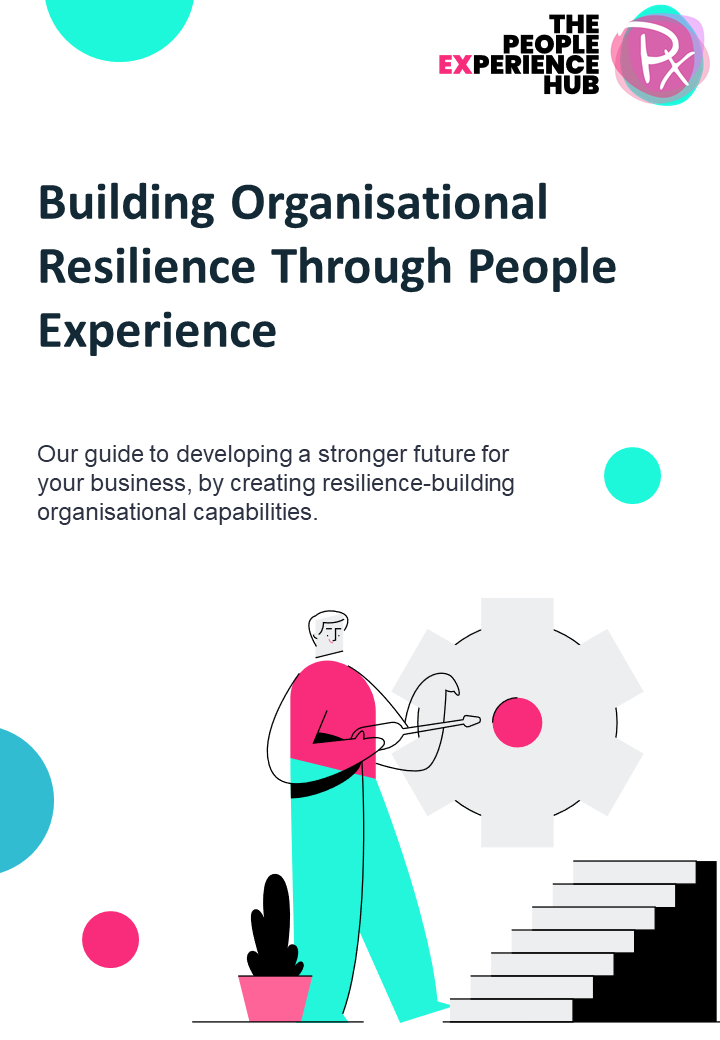OK, so 2020 was horrible. Let’s forget it and move on. Hang on a minute … that’s the wrong answer! At least it is if you are in HR and want to build an organisation that''s capable of dealing with the next major challenge, and the next.
Organisational Resilience is a key capability in a volatile world you and your HR team might be mentally and physically exhausted, having been through a period of rapid re-adjustment and change and you’re probably now facing unprecedented financial constraints. But COVID wasn’t a blip. It’s a symptom of the volatile, uncertain, complex and ambiguous (VUCA) world we’re living in and whether it’s in relation to the climate crisis, social change or technological disruption there will be more volatility to come. So, when you’re thinking about your people strategy for the post-pandemic world, I strongly recommend that you do it with organisational resilience in mind. What is Organisational Resilience? Organisational Resilience is the dynamic capability of an organisation to successfully deal with existential threats, stresses or crises, and emerge better equipped to deal with future challenges as a result.
Organisational Resilience involves characteristics and processes that emerge from the interaction between the organisation’s structures and processes, its people and its external environment, which enable the organisation to collectively: • Anticipate and prepare for potential threats • Cope with or mitigate the impact of a threat or crisis • Learn from the experience and adapt as a system According to Duchek’s (2020) model, Anticipation, Coping and Adaptation are presented as stages in a process but they are also overlapping and mutually supportive.
Why is Organisational Resilience important for HR?
During the pandemic, we’ve seen a shift towards organisations being more concerned with employee wellbeing, and that’s unlikely to change. There is a strong argument however that, rather than focusing on providing support for individual wellbeing, HR should focus on the influence of the organisation and the employee experience on wellbeing. Organisational Resilience promotes team resilience, in turn promoting individual resilience and wellbeing.
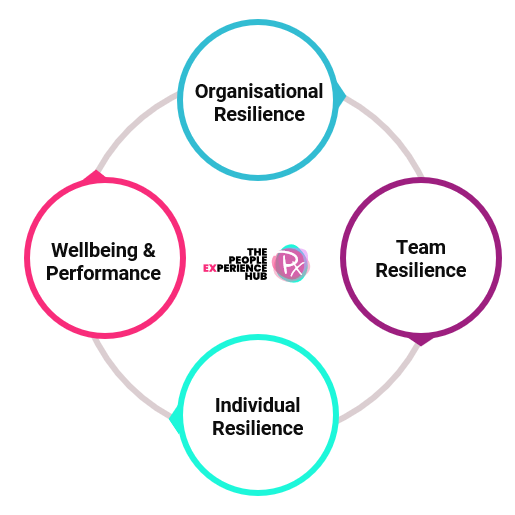
By focusing on the foundation that a positive employee experience provides for wellbeing, any further investment in supporting individual wellbeing is likely to be more successful and additive, rather than simply counteracting negative experiences.
What capabilities drive Organisational Resilience?
When you look at the capabilities that underpin Organisational Resilience, it’s fair to say that they’re not completely out of what with progressive HR practice anyway.
Anticipation capabilities Broad anticipation capabilities include observation and identification, and preparation.
Observation and identification (of emerging risk) Observation and identification means enabling people to build their awareness of the emerging environment through things like networking, but also making sure that they’re not overloaded and have the headspace to be open and receptive to signs of risk. Being aware of and bought into the organisation’s strategic vision and mission also means that people are better placed assess the emerging situation.
Preparation means having the processes to manage risk, plan for emerging scenarios and ensure business continuity, but from a people perspective means making sure that there is capacity for people to engage in preparation activity and that cross-functional teamwork is encouraged. Anticipation capabilities underpinning organisational resilience - observing and identification of risk, and preparation.
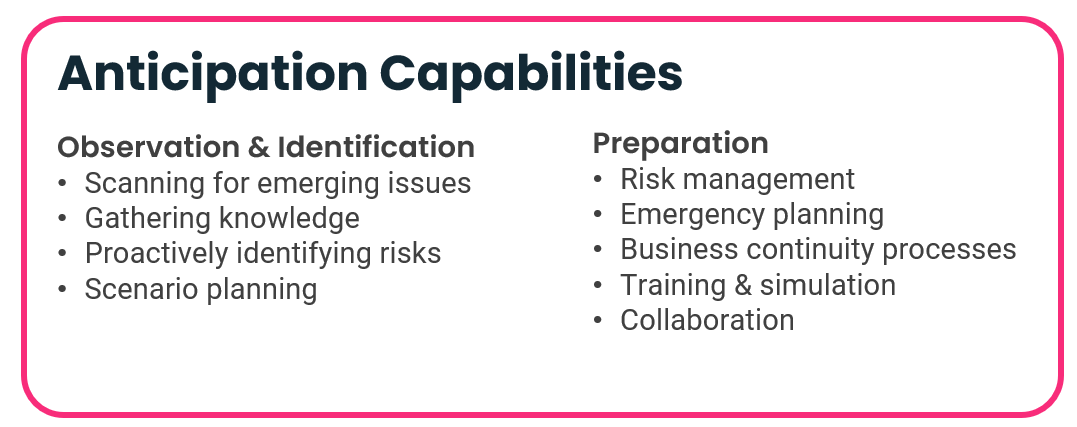
Coping capabilities
Confronting and accepting reality an important factor in confronting and accepting reality is psychological safety. People must feel comfortable raising issues without fear, and there must be trust that allows people to communicate openly and honesty at all levels. Leaders must have the humility to know the limits of their expertise and empower others to respond, rather than feeling that they must be in control. At the same time, in the moment of a crisis decisions must be made quickly. Having established mechanisms for quickly gathering and analysing employee feedback, for example, pulse surveys, can be very helpful in understanding the current situation.
Developing and implementing solutions Developing and implementing solutions in a potentially fast-moving and uncertain situation means having fast and effective decision-making. In some cases, this will be best achieved by a hierarchy with clear accountability, but not always. For example, the decision to shut down premises at the beginning of the Covid-19 crisis would probably be an executive decision. However, as the situation emerges, and solutions are needed on the ground, collaboration and knowledge sharing through formal and informal networks become increasingly important. Coping capabilities underpinning organisational resilience - confronting and accepting reality, and developing and implementing solutions.
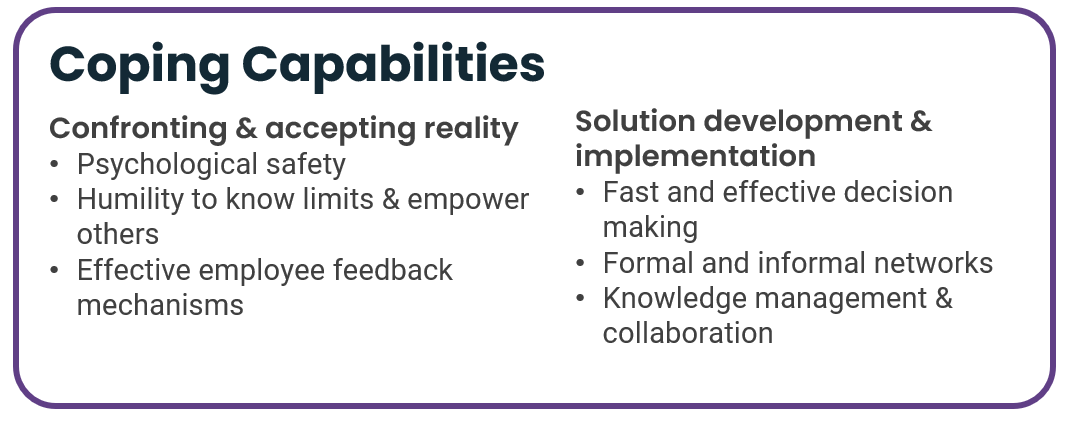
Adaptation capabilities Adaptation, at an organisational level, means reflecting and learning and managing change effectively.
Reflecting and learning we’ve been talking about ‘learning organisations’ for as long as I’ve been working in the people space (over 20 years) and I still haven’t seen many. My view is that’s because both reflection and dialogue are undervalued by leaders against a backdrop of business and, perhaps the need to feel ‘in control’ rather than questioning and listening. Equally, many senior leaders appear to wear their ‘bias for action as a badge of honour, when it’s more of weakness the higher you go. Under pressure, many managers and leaders also fail to see the opportunity for learning from mistakes or unexpected results.
Managing change much is said about the need to enable individuals and teams to change what they need to change in their own operational area, in a more bottom-up and agile way. While I don’t disagree with this, a coordinated approach to managing change is still important to ensure that change is implemented effectively, especially when it impacts people across team boundaries. Adaptation capabilities underpinning organisational resilience - reflecting and learning, and managing change
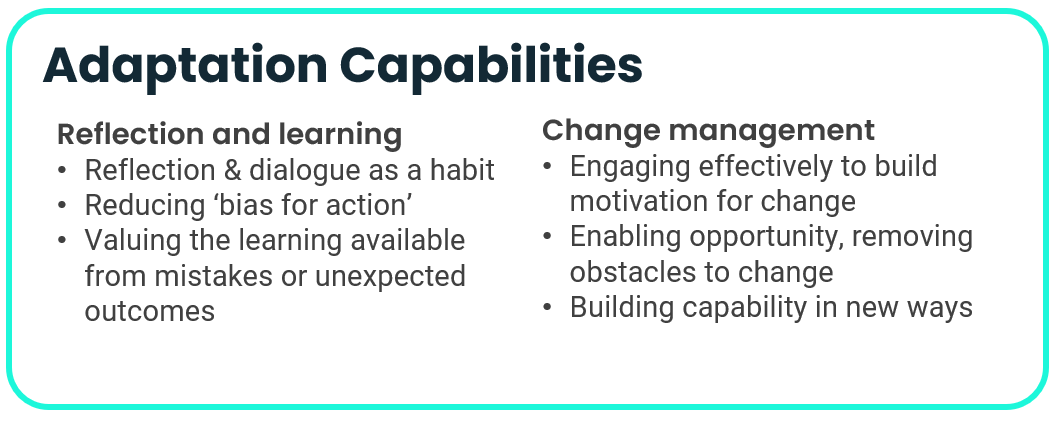
Five major implications of Organisational Resilience for HR The implications of organisational resilience for HR, based on Duchek’s framework, are both numerous and open to interpretation. However, I’d suggest that there are some that are more specific to the stages of anticipation, coping and adaptation and others that cross a range of them. Some of the bigger implications for HR as I see them follow. The good news is that they won''t be all that new to progressive people professionals like yourselves. Perhaps recovery from the pandemic is just the call to arms that we need to solve some of these challenges once and for all?
- Re-orientating to a shared sense of purpose Purpose is often seen as a fluffy, nice thing to have.. ..”we’re more than about profit, we’re about making the world a better place”. But what is apparent, and this is something I’ve been saying for years in the change space is that the relentless drive for lower costs in particular leaves people overworked, less aware of their environment, less able to engage with it and it holds them back from making change happen. In other words, always working at full (or over) capacity is a potential barrier to organisational resilience.
- Fundamentally re-examining leadership old models of leadership that imply command and control are long past their sell-by date. Although it was already true, the volatile and uncertain post-pandemic environment is a clear mandate for leadership based on humility, compassion, and dialogue. Of course, different situations require different styles, so adaptability is also critical.
- Flattening hierarchical organisational structures If command and control is out, then we must also question hierarchical organisational structures; though the structure itself is not necessarily always so much the problem as the way that power is managed within it. Still, there is a strong argument for removing unnecessary layers of management and decentralising decision making.
- Inherently valuing diversity / creating an inclusive culture Again, this is not a new subject, but the complexity and need for creative solutions during challenging times underline the importance of involving diverse perspectives in finding them. For that to happen under pressure, an inclusive, psychologically safe culture must already exist.
- Developing a strategic change capability means more than change management. It means investing in the organisation’s ability to realise the benefits of change again and again and involves making change a strategic leadership priority. This means investing in structure, capacity and capability to deliver change effectively and doesn’t mean that all change is managed in a top-down way, but does mean that it is enabled in a joined-up way. In our free download –Building Organisational Resilience Through the People Experience – we go into it, related concepts of resilience, and the implications for HR and Employee Experience professionals in more detail. We also suggest some steps for getting started, including a quick organisational resilience diagnostic that will help start the conversation. Download: Building Organisational Resilience Through the People Experience
